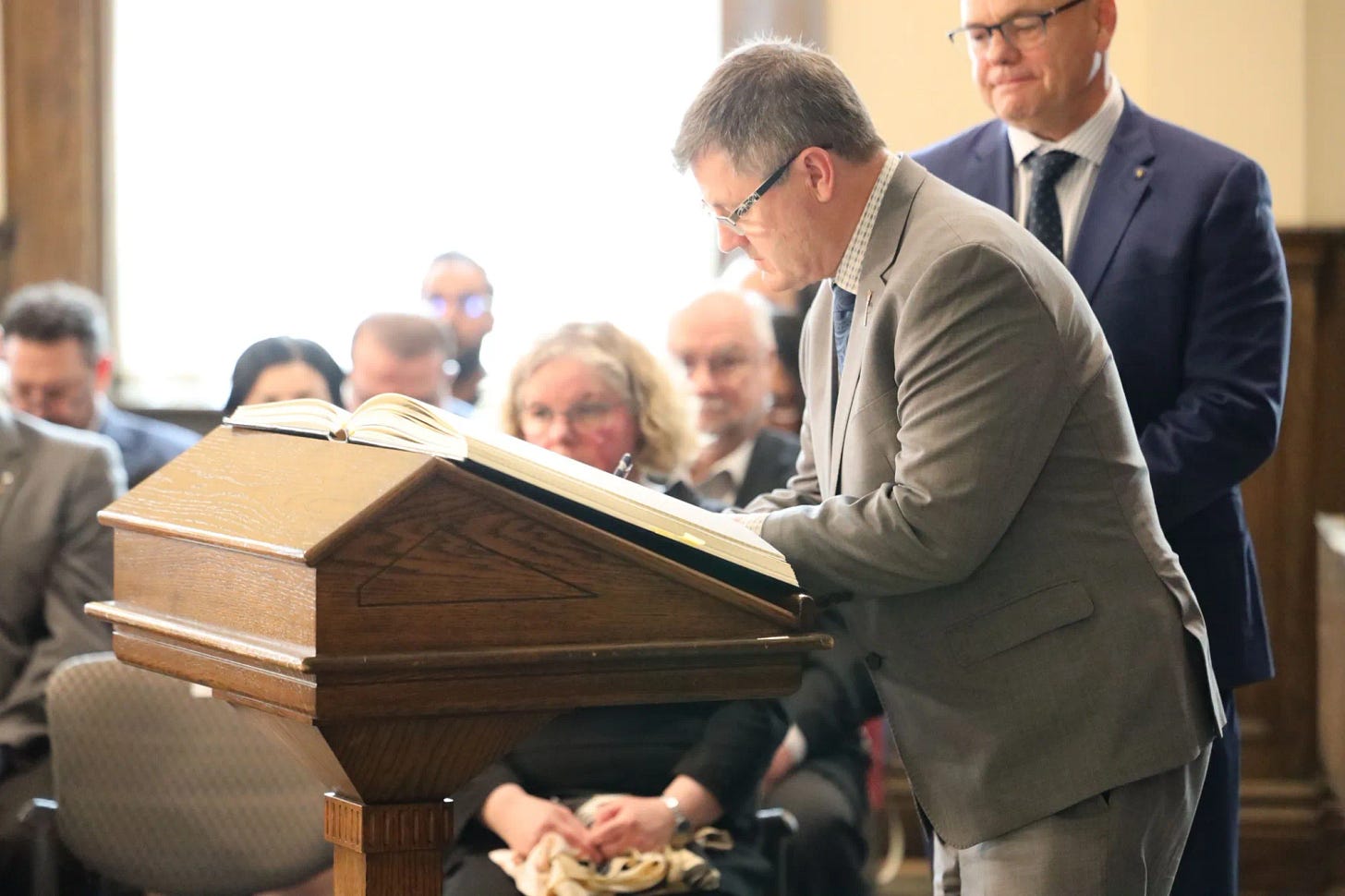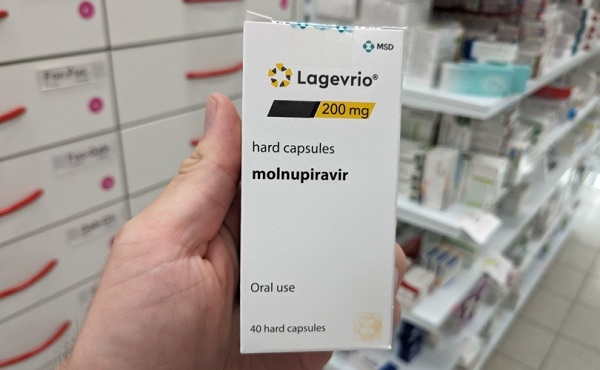Health
Dad says 5-year-old develops autism after being forced to get 18 vaccines in 1 day

From LifeSiteNews
By Michael Nevradakis Ph. D., The Defender
As part of a custody battle, a Tennessee judge ordered a family to vaccinate all three of their children, all of whom had never been vaccinated. Five-year-old Isaac immediately became ill and was eventually diagnosed with severe regressive autism.
In 2016, David Ihben moved his wife and three children from Chicago to Jamestown, in rural Tennessee, with high hopes for a new and calmer life.
But the dream turned into a nightmare for David and his children in December 2019, when divorce proceedings and a subsequent custody battle resulted in the forced vaccination of the children – and changed the family’s fortunes forever.
Ihben said his ex-wife decided “this wasn’t the life she wanted.” So they were attempting to develop a parenting plan in family court – when Tennessee judge Todd Burnett “pulled up the vaccine issue” after discovering the couple’s children were unvaccinated – and forced the parents to vaccinate their children.
Ihben’s two oldest children – daughter Hannah and son Joseph – were spared significant adverse events following their vaccination.
But his youngest son, Isaac, wasn’t so fortunate. After receiving 18 vaccines in one day, Isaac developed severe regressive autism. Today, he requires around-the-clock care.
The children’s mother soon abandoned the children, leaving Ihben to raise them as a single parent – even though he is still obliged to pay child support.
Ihben shared his story with Children’s Health Defense’s (CHD) Vax-Unvax bus. In a subsequent interview with The Defender, he detailed the challenges he faces in caring for Isaac and the harassment he endured from officials in his community. Ihben shared documentation with The Defender verifying his story.
‘How can a judge force medical care without a doctor’s input?’
Ihben told The Defender his entire family was unvaccinated. “I’ve never had any. My dad was drafted by the Army in 1961, and he didn’t get any either. We’ve never vaccinated,” he said. “Our children had to sign religious exemptions for school.”
During divorce proceedings though, his wife’s attorney used the vaccination issue to drive a wedge between the parents.
“When we went to court, I guess her attorney knew that [Burnett] was a pro-vaccine judge and that’s something that they could get me on,” Ihben said.
According to Ihben, Burnett told the couple that it was his “personal opinion that not vaccinating your children is child abuse.” He then told the couple that whichever parent would be willing to vaccinate the children that same day would leave the courthouse with custody.
“I said, ‘Your Honor, we have rights. It’s between the mom and their father,’” Ihben recalled. “Her attorney whispered to her, and she goes, ‘I’ll take them down and vaccinate them today.’”
“I was so surprised, because me and my ex-wife didn’t agree on much, but we did agree on that,” Ihben said, referring to their views on vaccination.
After the hearing, Ihben and his wife were granted joint custody of the children, with their mother as their primary guardian. Later that day, the children received their childhood vaccines – and Isaac immediately became sick.
“My daughter had previous allergies … so the doctor refused to give her all in one day. They split those … She didn’t have any side effects from what I can see,” Ihben said. “[Joseph] was in the ICU for a couple of days but seems to be okay. But [Isaac] spent 12 days in the ICU, eight days with a 106-degree fever.”
Isaac, who was 5 years old at the time, was “just a normal happy kid,” Ihben said.
Today, Isaac has severe regressive autism. Ihben told The Defender:
“He doesn’t talk. He wears a diaper. He eats out of a baby bottle 20-30 times a day, he has speech therapy and will require 24-hour care and supervision for the rest of his life.
“I haven’t had a full night’s sleep in four years. He has to be changed every two hours, or he will have an accident. If you have a child with regressive autism or know someone, you will understand what our days are like.”
Ihben didn’t learn about Isaac’s injuries right away, because the court initially slapped him with a six-month restraining order. When the six months were up, he finally made plans to pick up his children for “two-hour supervised visitation” at a local McDonald’s.
“My youngest comes walking out and I’m like, ‘What’s going on?’” He said his oldest children then told him about what happened to Isaac. “My children told me everything that’s going on. Basically, nobody’s given me information. I had to go off what 10- and 11-year-olds were telling me,” Ihben said.
Ihben tried to find out what happened to Isaac – but encountered more obstacles at Cookeville Regional Medical Center, his local hospital. “The judge had sealed the hospital records. I still cannot get them,” he said.
It wasn’t until he enrolled his daughter in high school that, while obtaining her records from the local health department, he had a chance to view Isaac’s records. That’s when he saw that Isaac had received 18 vaccines in one day.
“How can a judge force medical care without a doctor’s input?” Ihben asked. “I don’t think judges should be dictating medical treatment from the bench.”
According to Ihben, doctors at Vanderbilt University in Nashville said Isaac’s injuries “are a direct result from forced vaccination,” with one doctor telling Ihben that “she’s seen only one other kid that acts like Isaac does.”
Required to continue paying child support, despite mother’s disappearance
Soon after seeing his children for the first time after the custody battle, another surprise was in store for Ihben and his family: Ihben’s ex-wife called to say she and the children had been evicted.
After he kept the children for a week, their mother “got a free house, everything furnished and paid,” and the children were returned to her.
“Then she got evicted from there” in May 2020, Ihben said. He again picked up the children – but that was the last they saw of their mother. According to Ihben, after her second eviction, she left town without a trace.
“We haven’t heard from her or seen her,” Ihben said. “It’ll be five years in May.”
Ihben still pays child support to the state, even though he alone takes care of the children. He said the child support money, which remains uncollected, goes to a state fund – and, if it remains unclaimed, will be confiscated by the state when the children reach adulthood.
Ihben said that though he has gone to court to request full custody of his children or a reduction of his child support payments, he has faced a catch-22 situation.
“The judge said, I can’t do anything unless you get her here in front of me,” Ihben said. “I was like, ‘I’ve served her. Nobody knows where she is.’”
Ihben said he believes the children’s mother didn’t realize Isaac was going to be hurt so badly, and “she just can’t face it.” He added, “I just don’t understand, if she’s been gone almost five years, why she still has full custody, why I still have to pay child support.”
Tennessee laws, local officials pose challenges for raising Isaac
Ihben described the day-to-day realities of caring for Isaac, who will turn 11 next month and just started the fifth grade in a special education program. He said:
“Our lives have changed forever. I can’t have a regular job. I pick up stuff here and there … I have an alarm that goes off every two hours to change Isaac. He eats in the middle of the night … We live out in the country. There’s no bus, so I take him to school back and forth.
“He doesn’t talk, so you don’t know if he’s sick, if he’s upset, if he’s hungry, if he’s cold, if he has a stomach ache … I’ve got a mental list, and I just check it off and hopefully I hit the one that calms him and provides what he needs.”
State rules also pose obstacles. “You’re not allowed to have home healthcare for a disabled child unless you have no other children in the home under 18,” Ihben said.
Ihben noted that Tennessee ranks among the states with the lowest level of funding for autistic children, adding that autistic children are frequently mistreated.
“Our local school district has restraint chairs for autistic children. They are allowed to put Isaac in a chair, to pepper spray him, to tase him. Police departments have no training for dealing with autistic children,” Ihben said.
Ihben said state, county and town officials have attempted to intimidate him and his family.
According to Ihben, the Tennessee Bureau of Investigation (TBI) showed up at his home on Dec. 5, 2023. “Somebody starts beating on the door … there’s a truck at the end of the road, a truck at the end of the other road and two trucks in the driveway. They had assault weapons.”
Ihben said the officers claimed that a social worker wanted to speak with him, but that he refused to open his door for them. He submitted a Freedom of Information Act request to the state to find out why his home was raided, but was told there are “no records of anything.”
The TBI raid took a toll on him. “I had a heart attack that night,” he said. “I couldn’t breathe.” He said the incident still affects him today. “I’m sure I have PTSD from it. I’m still under treatment,” Ihben said.
In June 2023, Ihben said he went to his county commission meeting to tell them about what happened to his family. The county commissioner, Jimmy Johnson, left him a voicemail warning him not to hold any rally or protest.
“The commissioner called the sheriff,” Ihben said, but ultimately “they backed off.”
In another incident, Ihben said he was banned from his local Walmart store after a store manager called the police because Isaac “was causing a disturbance.” This obliged Ihben to shop at another Walmart, an hour away from his home.
Ihben said it’s also difficult to find a lawyer to represent him and his family. “No attorney is willing to take on the judge.”
Local officials ‘tried to scare us’ into not doing Vax-Unvax bus interview
Ihben credited CHD and its Tennessee Chapter for helping him and his family. “We wouldn’t be here without CHD helping us out,” Ihben said. “The Tennessee Chapter has helped us out a lot.”
Ihben said he recently saw “Vaxxed 3” with members of the state’s CHD chapter. “What we have to live through every day is horrible, but it could be worse,” Ihben said, citing stories in the film of children who died post-vaccination.
According to Ihben, his efforts to promote CHD initiatives in his community, such as the visit of the Vax-Unvax bus earlier this year, have also been met with intimidation.
“We put a little flyer together [for the Vax-Unvax bus] and we started passing it out,” Ihben said. But on Feb. 1, the day of his bus interview, Ihben said his wife’s attorney, her husband – who is the attorney for the local school board – and Burnett, who mobilized the TBI, “tried to scare us into not doing the bus interview.”
Getting the word out, spreading the message is ‘the only weapon we have’
Isaac has recently shown some improvement, according to Ihben. “He’s doing better slowly … He’s in a lot of therapy. He’s starting to write some numbers and letters on his own. Teachers think he’s reading, but he’s still never said a word.”
Ihben said this has been a learning experience for his oldest children, who will “have to take care of Isaac every day” after his death. “That’s a lifetime commitment.”
Another silver lining, according to Ihben, is that Isaac’s story has become a learning experience for his family and many members of his local community.
“This hasn’t just got me learning. My kids are learning. Hannah and Joseph are learning about their government and their food and their environment. They’re teaching their friends about this.”
For Ihben, getting the word out and spreading the message is “the only weapon we have.” He said, “It’s powerful that my kids’ friends come up and say ‘we’re sorry for what happened to you, we’ve seen the [Vax-Unvax] interview.’”
Ihben said he hopes the message will help other children avoid Isaac’s fate. “I hope Isaac will be the last,” he said.
This article was originally published by The Defender – Children’s Health Defense’s News & Views Website under Creative Commons license CC BY-NC-ND 4.0. Please consider subscribing to The Defender or donating to Children’s Health Defense.
Great Reset
U.S. rejects WHO pandemic amendments, citing threat to sovereignty

Quick Hit:
- The U.S. State Department and HHS transmitted the official rejection of the 2024 amendments to the WHO’s IHR.
- Officials cited threats to national sovereignty, vague terminology, and the WHO’s political susceptibility—particularly to China—as grounds for rejection.
- The amendments would have mandated WHO-led responses, digital health documentation, and “equitable access” initiatives regardless of U.S. withdrawal from the WHO.
RFK Jr. just announced he has rejected the WHO’s draconian new pandemic treaty.
Every American should care about this.
“Last year, the World Health Organization’s governing body made some far-reaching amendments to its international health regulations, otherwise known as the… pic.twitter.com/GI9UzsTrKv
— MAHA PAC🗽 (@MAHA_PAC) July 18, 2025
Diving Deeper:
The rejection represents a sharp rebuke of the World Health Assembly’s 2024 amendments to the International Health Regulations (2005), which sought to centralize global pandemic decision-making power within the WHO. Kennedy and Rubio emphasized the amendments’ “vague and broad” language and their potential to create policy rooted in politics and global “solidarity” rather than science and national interest.
Among the most controversial changes were new authorities for the WHO to unilaterally declare health emergencies, coordinate international responses, and guide member states toward “equitable access” to vaccines and other health commodities. The amendments also encouraged countries to implement digital health documents—raising red flags for privacy and surveillance concerns.
“The amendments risk unwarranted interference with our national sovereign right to make health policy,” the joint statement read. Kennedy and Rubio specifically criticized the lack of public input in drafting the new rules and warned that WHO directives could suppress legitimate scientific debate and restrict Americans’ freedom of speech under the guise of “controlling misinformation.”
The officials pointed to the WHO’s well-documented failures during the COVID-19 pandemic, including its deference to the Chinese Communist Party, as a stark example of why international bodies should not be granted binding authority over U.S. domestic policy. “These amendments… fail to adequately address the WHO’s susceptibility to political influence and censorship—most notably from China—during outbreaks,” the statement noted.
Even more alarming, the statement highlighted that the amended rules would have bound the U.S. regardless of its current status in the WHO, essentially imposing obligations on a nation that is no longer part of the organization. This drew particular concern from Rubio, who has long warned against ceding U.S. autonomy to global institutions.
In reaffirming their commitment to “put Americans first,” Kennedy and Rubio vowed to continue resisting international encroachments on U.S. freedoms. “We will not tolerate international policies that infringe on Americans’ speech, privacy, or personal liberties,” they declared.
This formal rejection marks a victory for critics of globalism and top-down health mandates, signaling that under the current administration, American decision-makers are prioritizing sovereignty, transparency, and constitutional protections over global consensus driven by unelected bureaucrats.
Addictions
From opioids to office: An interview with Alberta’s new addiction minister

By Alexandra Keeler
Rick Wilson shares what led him into — and out of — addiction, his goals for Alberta’s recovery model and the value of an ‘Indigenous lens’
In mid-May, Alberta appointed Rick Wilson as the province’s new minister of mental health and addiction.
Wilson, who represents the Maskwacîs-Wetaskiwin riding south of Edmonton, was Alberta’s longest serving minister of Indigenous relations, serving from 2019 to this year.
Now, Wilson is tasked with accelerating the implementation of the Alberta Model, a recovery-oriented system of care that prioritizes addiction prevention, early intervention and treatment over harm reduction.
Canadian Affairs spoke with Wilson about his priorities in the new role, how his prior work with Indigenous communities shapes his perspective and what lies ahead for mental health and addiction care in Alberta.
AK: I understand you’ve been tasked with advancing the Alberta Recovery Model. What aspects of the model require the most focus in the term ahead?
RW: My goal is going to be to keep the momentum going. [We need to] get all the recovery communities opened up, keep expanding our supports, like CASA Classrooms [classroom-based mental health programs], and just keep filling the gaps for better information.
AK: Why was your predecessor, Dan Williams, shuffled out of the post?
It was a cascading event. Our speaker took a job in Washington, so we voted for a new speaker, Rick McIver. That left a hole in Municipal Affairs, [where Dan was moved]. I’d been bugging Premier Smith for more help with addictions and mental health. She said, ‘Go fix it then, I’ll put you there.’
AK: Do you have personal experience with mental health or addiction struggles?
RW: Do you want the whole sad story here?
I used to raise a lot of cattle and had one really rank bull that was terrorizing the farm. One morning I tried to get him up, and it didn’t end well — he got me down, fractured several vertebrae in my neck and back, and collapsed my lungs. I don’t know how I survived, but somehow I did.
For a year, I couldn’t walk. I was in so much pain I didn’t even know who I was. I would literally pray for one second of relief. Whatever the doctor gives you, you’ll take it — Oxytocin to Percocet; you name it, I was on it. My wife said she’d give me a pill and an hour later, I’d be begging her for more. This went on for close to a year.
I finally had what’s called laser spinal surgery. I was one of the very lucky ones. I went into it in a wheelchair, but I came out walking, and the pain was gone.
About a week later, I told my wife, ‘I think I’m full of infection — I’m burning up with fever, I’m sweating, and I think they’ve nicked a nerve. I feel like I got a giant hole in me.’ She looked at me like I was crazy.
We went to the doctor. He said I was completely healed and asked, ‘What do they have you on?’ Then he said, ‘You just quit taking everything?’ I told him, ‘Yeah, there’s no more pain, so I just quit.’
He said, ‘Well, you’re in withdrawal.’
Once I knew what it was, I was able to tough it out, but it’s not a pleasant experience. I don’t think people are really trying to get high — you just don’t want to feel that alone. I literally felt like there was a hole right through me, like I was just empty inside. So I have a lot of empathy for people that are in addiction.

Rick Wilson was sworn in as the Minister of Mental Health and Addictions on May 16. | Rick Wilson via Facebook
RW: When I was in Indigenous Relations, half my time was spent around addiction issues. It’s horrible. Out on the First Nations, there’s hardly a chief who hasn’t lost a son or somebody close to them. That’s all I did — go to funerals, one after another.
What I learned was you really just have to listen — and that’s one thing the government isn’t good at.
AK: What learnings from that role are you bringing to your new portfolio, and how do you see them benefiting your work in mental health and addiction?
RW: I want to put an Indigenous lens on the whole thing. I think that’s the piece we’re missing. What I found most successful was to use their culture. Get the elders involved. They have the sweats, smudges and language. To take somebody’s language away is devastating.
You hear a lot about reconciliation, but I took it for real. My good friend Willie Littlechild said, ‘Minister, I want to see some reconcili-action.’ He said I could use that — so I do, a lot.
AK: Can Indigenous recovery models work more broadly for non-Indigenous Albertans?
RW: I’ve really seen it work with non-Indigenous folks as well. But everybody’s going to be different. For some people, maybe Christianity is the way to go. And for some people, it’s Alcoholics Anonymous.
I think [the common thread] is that hope. [When you’re addicted] you feel hopeless.
I felt empty, and you need something to replace that emptiness. The problem is, you turn to alcohol, you turn to drugs to fill that gap, and that’s not going to do it. It’s a very temporary fix that just pushes you deeper down the rabbit hole.

Minister Rick Wilson celebrates the Pigeon Lake Regional School Class of 2025 on May 25. | Rick Wilson via Facebook
AK: Can you explain what a recovery community is, and how it fits into the province’s continuum of care?
RW: The way they used to do it, you’d throw someone in recovery for a couple of weeks [and expect] that should cure it, then out you go. Well, that doesn’t work.
[Now] it’s more of a holistic approach: you go into detox, and then from there, you go into rehab. Some people fall out of rehab, [but they go] back into detox, and eventually you start working your way around the circle.
Transitional housing is key. You can’t just send someone back into the community without support — they’ll relapse. After housing, the focus is on community reintegration, finding work, and family support. It’s like an Indigenous healing circle — a full circle to prevent falling back into addiction.
We’re working on 11 sites — one in Red Deer, Gunn, Lethbridge and Calgary opening this summer. Seven more are planned, including Edmonton, Grande Prairie and five with Indigenous communities.
AK: Some critics argue that the Alberta Model leans toward coercive care, and that the benefits of involuntary treatment may not outweigh the risks and costs. How will the Compassionate Intervention Act, which mandates addiction treatment, address those concerns?
RW: Compassionate care isn’t just for the individuals [with substance use disorders]. We have to be compassionate for them, but we also have to be compassionate for the people in their community that are impacted.
In my own riding in the Maskwacîs-Wetaskiwin — some people come in [to the hospital] three times in a day that have overdosed. To overdose several times a day — you’re doing brain damage when you’re at that point.
These people are in dire straits, and we have to intervene with them, because they’re not even capable of thinking for themselves [or] to go for voluntary treatment. We want to give the people that are addicted that opportunity to rebuild their lives. Right now, there’s just a lot of enabling going on.
This interview has been edited and condensed for clarity.
This article was produced through the Breaking Needles Fellowship Program, which provided a grant to Canadian Affairs, a digital media outlet, to fund journalism exploring addiction and crime in Canada. Articles produced through the Fellowship are co-published by Break The Needle and Canadian Affairs.
-

 Education1 day ago
Education1 day agoWhy more parents are turning to Christian schools
-

 Alberta1 day ago
Alberta1 day agoOPEC+ is playing a dangerous game with oil
-

 Alberta1 day ago
Alberta1 day agoUpgrades at Port of Churchill spark ambitions for nation-building Arctic exports
-

 Business1 day ago
Business1 day agoIs dirty Chinese money undermining Canada’s Arctic?
-

 COVID-191 day ago
COVID-191 day agoJapan disposes $1.6 billion worth of COVID drugs nobody used
-

 conflict1 day ago
conflict1 day agoOne of the world’s oldest Christian Communities is dying in Syria. Will the West stay silent?
-

 COVID-191 day ago
COVID-191 day agoWATCH: Big Pharma scientist admits COVID shot not ‘safe and effective’ to O’Keefe journalist
-

 Bruce Dowbiggin1 day ago
Bruce Dowbiggin1 day agoHow Did PEI Become A Forward Branch Plant For Xi’s China?






